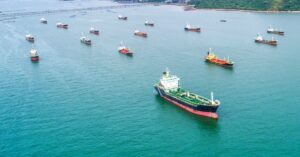
Maritime Technologies Forum Issues Safety Guidelines For Methanol Dual-Fuel Ship Inspections
October 1, 2025
Jan De Nul Builds New Vessel To Protect Critical Subsea Infrastructure
October 1, 2025

Yemen’s Houthis have announced sanctions on several major U.S. oil companies, executives, and tankers, saying the move is a direct response to U.S. sanctions against the group earlier this year.
The announcement was made by the Humanitarian Operations Coordination Center (HOCC), a Sanaa-based body set up last year to coordinate between Houthi forces and shipping operators.
According to HOCC, 13 U.S. companies, 9 executives, and 2 vessels have been placed under sanctions. The list includes oil majors ExxonMobil and Chevron, as well as Phillips 66, Marathon, Conoco, and Valero.
The Houthis said the sanctions are linked to what they described as the “facilitation of U.S. oil exports.” The group accused the companies of being involved in the export, re-export, loading, transport, purchase, or sale of U.S. crude oil, either directly or indirectly, from American ports. They also included ship-to-ship (STS) transfers and sales through third parties in their accusations.
The group also targeted Diamond S Shipping, naming two crude oil tankers associated with the company. The vessels, Seaways San Saba and Seaways Brazos, are both Marshall Islands-registered, built in 2012, and each has a deadweight tonnage of 159,000. HOCC said the two ships are currently sailing toward South America.
The Houthis claimed that their leadership had already issued a ban on U.S. oil exports in May 2025. The group, however, did not issue any direct threats of attacks against the sanctioned companies or vessels.
Analysts say the latest move raises questions about whether the Houthis might target ships linked to the sanctioned firms. Independent Middle East analyst Mohammed Albasha noted that such actions could risk violating the truce agreement the group reached with the Trump administration earlier this year, which was brokered by Oman. Under that deal, the Houthis had agreed to stop attacking U.S.-linked vessels in the Red Sea and Gulf of Aden.
Albasha added that the sanctions would not affect global oil markets, since most regional trade is handled by Chinese, Russian, Iranian, and Gulf companies that the Houthis want to maintain good relations with. In its statement, HOCC said the aim of the sanctions was not punishment but to encourage positive behavioral change.
On Monday, the Houthis claimed responsibility for a cruise missile strike on a Dutch cargo vessel in the Gulf of Aden. The attack left the vessel on fire, injured two crew members, and left it drifting. While most recent attacks have targeted Israel, the group has also occasionally struck ships in the Gulf of Aden, a key route between the Red Sea and the Arabian Sea.
Despite repeated threats, the Houthis have not significantly affected oil traffic through the Strait of Hormuz, the narrow waterway between Oman and Iran that connects the Persian Gulf to the Arabian Sea.
According to the U.S. Energy Information Administration (EIA), the United States imported about 500,000 barrels per day of crude and condensate from Gulf countries via the Strait in 2024. That accounted for around 7% of total U.S. imports, the lowest level in nearly four decades due to higher domestic output and Canadian imports.
The Houthis have also continued to threaten U.S. warships operating in the Red Sea, though no direct attacks on American vessels have been reported since the ceasefire and subsequent U.S. bombardments of Houthi positions earlier in the year.
Reference: Reuters
Source: Maritime Shipping News


